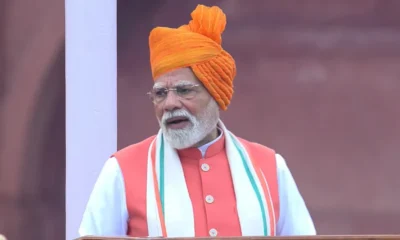[vc_row][vc_column][vc_column_text]Tehreek-e-Labaik Ya Rasool Allah, other Islamic groups had laid siege on Islamabad last week protesting against a ‘blasphemous’ amendment to the Elections Act
Late on Sunday night, Pakistan’s Federal law minister Zahid Hamid resigned from office; a decision that is likely to pave the way for ending a week-long siege of the country’s capital, Islamabad, by hard-line Islamist groups who have been protesting against a now-abandoned ‘blasphemous’ amendment to the Elections Act, 2017.
Hamid’s resignation was a key demand put forth by the protestors – led by the hitherto little-known hard-line group Tehreek-e-Labaik Ya Rasool Allah Pakistan (TLYR) – as a pre-condition for ending their agitation, which had turned violent and claimed six lives while leaving over 200 injured through the weekend.
The standoff had begun between the government and protestors over a recent amendment to the Elections Act, which sought to alter the ‘Finality of Prophethood’ declaration that electoral candidates in the country have to mandatorily make while being sworn-in.
Although the government had hastily abandoned the amendment, with some sections having even declared it as a ‘clerical error’, the protestors had continued their agitation and pressed for Hamid’s resignation as the first condition for restoration of normalcy.
The TLYR has claimed that Hamid oversaw the introduction and passage of the Elections Amendment Bill 2017, which altered the text of a form that candidates contesting elections need to sign. The candidates were earlier expected to “solemnly swear” that they believe Muhammad was Islam’s last prophet. The new amended form – now abandoned – asked candidates to swear that they “believe” in the finality of Muhammad’s prophethood – an issue of semantics that the hardliners felt was the Pakistan government’s ‘softening’ of stance against the Ahmadiyya sect of Islam – a persecuted minority group who many in the Islamic country don’t consider to be Muslims.
While a detailed statement by Hamid is still awaited, his fleeting comments have been flashed by media organisations in Pakistan in which he has claimed that the contentious amendment was not his handiwork but one that was “formulated by a parliamentary committee comprising members belonging to all political parties.”
Hamid told Pakistan’s Geo TV that he was “not directly responsible for the introduction of the controversial amendment to the Finality of Prophethood declaration for electoral candidates” but that he had decided to step down from his office of the Federal law minister “in order to restore peace in the country.”
Pakistan’s leading media organisation Dawn said in a report: “The minister’s resignation comes in the aftermath of Saturday’s botched operation against protesters at Faizabad and ‘successful negotiations’ with leaders of the demonstration late on Sunday night”.
With Hamid resigning, evidently under pressure from the Islamists, TLYR leader Khadim Hussain Rizvi addressed a press conference at the Faizabad Interchange protest site in Islamabad and ordered his followers across Pakistan to end the sit-ins and go home. He also announced an end to the strike being observed on Monday and called for opening businesses and shops.
Rizvi declared that the Islamist protesters camping at the Faizabad Interchange will depart from the protest site within 12 hours, as soon as implementation of the agreement reached with the government is started.
The TLYR leader claimed that Pakistan’s Army Chief Qamar Javed Bajwa and Major General Faiz Hameed had acted as guarantors for the agreement between the protestors and the federal government.
A report by Dawn said that according to a document circulating among journalists that bears signatures of the protest leaders and Pakistan’s Interior Minister Ahsan Iqbal, among others, the federal government has agreed to the following demands put forth by the TLYR in order to end the sit-in:
- Remove Federal Law Minister Zahid Hamid from his position immediately. “Tehreek-i-Labaik will issue no fatwa [religious decree] of any kind against him.”
- The report prepared by Raja Zafarul Haq-led committee will be made public within 30 days and whoever is named in the report for being responsible for the change in the election oath will be acted against under the law.
- All protesters arrested between November 6 until the end of the sit-in from across the country will be released within one to three days according to legal requirements. The cases registered against them and the house arrests imposed on them will be ended.
- An inquiry board will be established to probe and decide what action to take against the government and administration officials over the operation conducted by security forces against protesters on Saturday, November 25. The inquiry should be completed within 30 days and action will be taken against those found responsible.
- The federal and provincial governments will determine and compensate for the loss of government and private assets incurred from November 6 until the end of the sit-in.
- The points already agreed to concerning the Government of Punjab will be fully implemented.
[/vc_column_text][/vc_column][/vc_row]


 India News14 hours ago
India News14 hours ago
 India News13 hours ago
India News13 hours ago
 India News4 hours ago
India News4 hours ago
 Cricket news3 hours ago
Cricket news3 hours ago
 India News2 hours ago
India News2 hours ago















